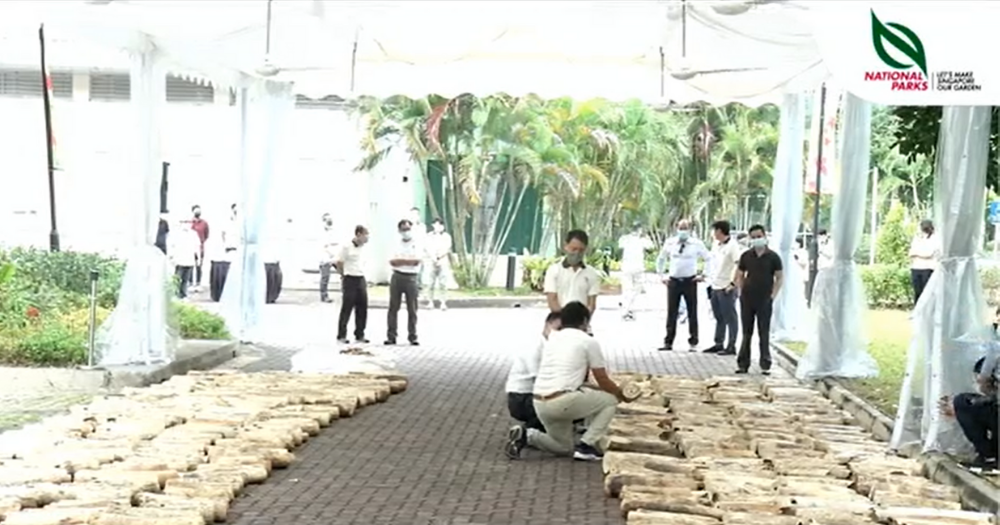To commemorate World Elephant Day, which falls on August 12, the National Parks Board (NParks) will be crushing nine tonnes (9,000kg) of ivory seized from illegal shipments.
This translates to a market value of S$18 million.
According to the Convention on International Trade in Endangered Species of Wild Fauna and Flora (CITES), the term "ivory" was traditionally used to describe the tusks of elephants.
Today, the term can be used to describe any tooth or tusk obtained from mammals, which are of commercial interest.
Why crush ivory?
To signify Singapore's commitment and determination to fighting the illegal wildlife trade, the ivory will be crushed over three to four days, according to NParks' Group Director of Wildlife Management Adrian Loo.
Loo added that collaboration between various agencies, such as NParks, Singapore Customs, ICA and international counterparts, led to a record amount of seizures of pangolin scales and elephant ivory over the years.
This includes 8,800kg of ivory seized in July 2019 and 37,400kg of pangolin scales in April and July 2019.
In addition, destroying the ivory will prevent it from re-entering the market and will disrupt the global supply chain of the illegal animal part.
The ivory will be crushed using an industrial rock crusher, and all crushed ivory will be incinerated after the crushing process.
This ivory crushing event by NParks will be the largest one since 2016.
Largest ivory seizure in S'pore happened in 2019
Most of the ivory that will be crushed today (August 11) and over the next few days was from the largest ivory seizure to date in Singapore that happened on July 21, 2019.
The illegal ivory products were discovered by NParks, Singapore Customs and the Immigration and Checkpoints Authority when they inspected a 12-metre container that was from the Democratic Republic of Congo and was destined for Vietnam.
When the shipment was inspected, 11,900kg of pangolin scales, packed in 237 bags and worth about SS$48.6 million, and 8,800kg of raw elephant ivory, packed in 137 bags and worth about S$17.6 million, were uncovered.
There were around 1,548 pieces of ivory from the seizure.
Information from the seizures was shared with the relevant countries and organisations for further investigation.
Improving local capability
Beyond the event, Singapore is building its local capability in analysing data obtained from the seizures of illegal flora and fauna to help identify global syndicates across the globe.
To do this, NParks launched the Centre for Wildlife Forensics to utilise DNA analysis methods and chemical methods, such as next generation sequencing and mass spectrometry, to understand the origin of the species that have been poached.
Samples from the illegal shipments of ivory have already been extracted for DNA analysis prior to today's ivory crushing event.
Minister of National Development Desmond Lee highlighted at the ivory crushing event that local agencies will work together to combat the wildlife trade and urged individuals to play their part in protecting endangered species:
"The National Parks Board, Singapore Customs, and the Immigration & Checkpoints Authority of Singapore will continue to work closely together, and with our international partners, to maintain Singapore’s vigilance against the illegal trade in CITES-listed species.
All of us can also do our part to help protect elephants and other endangered species by not buying illegal wildlife products, and also discourage others from doing so too."
Related story:
If you like what you read, follow us on Facebook, Instagram, Twitter and Telegram to get the latest updates.
